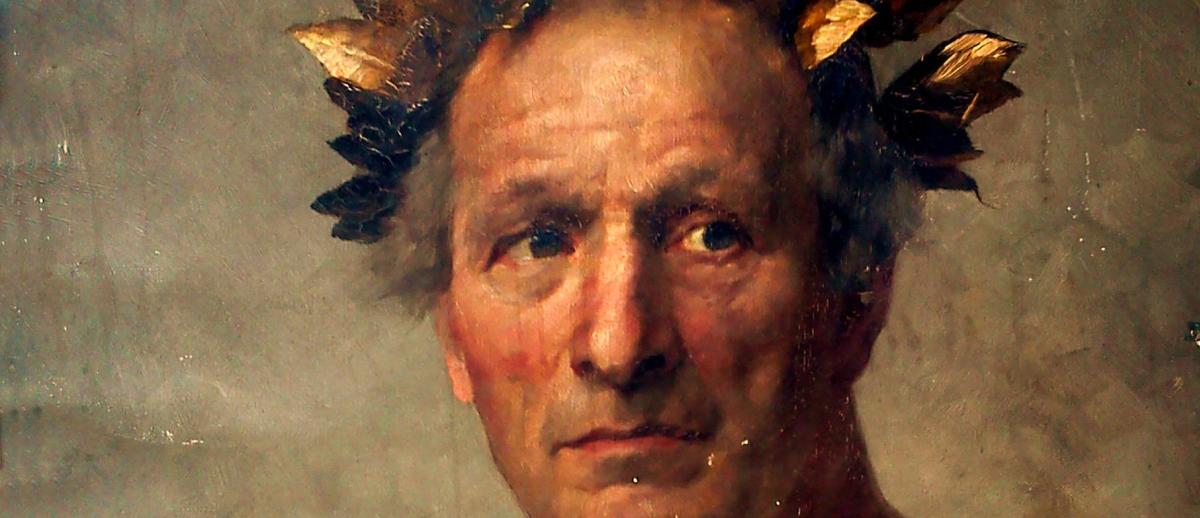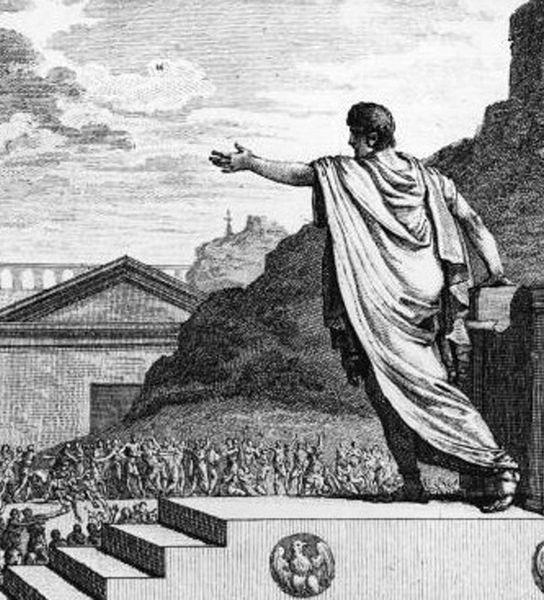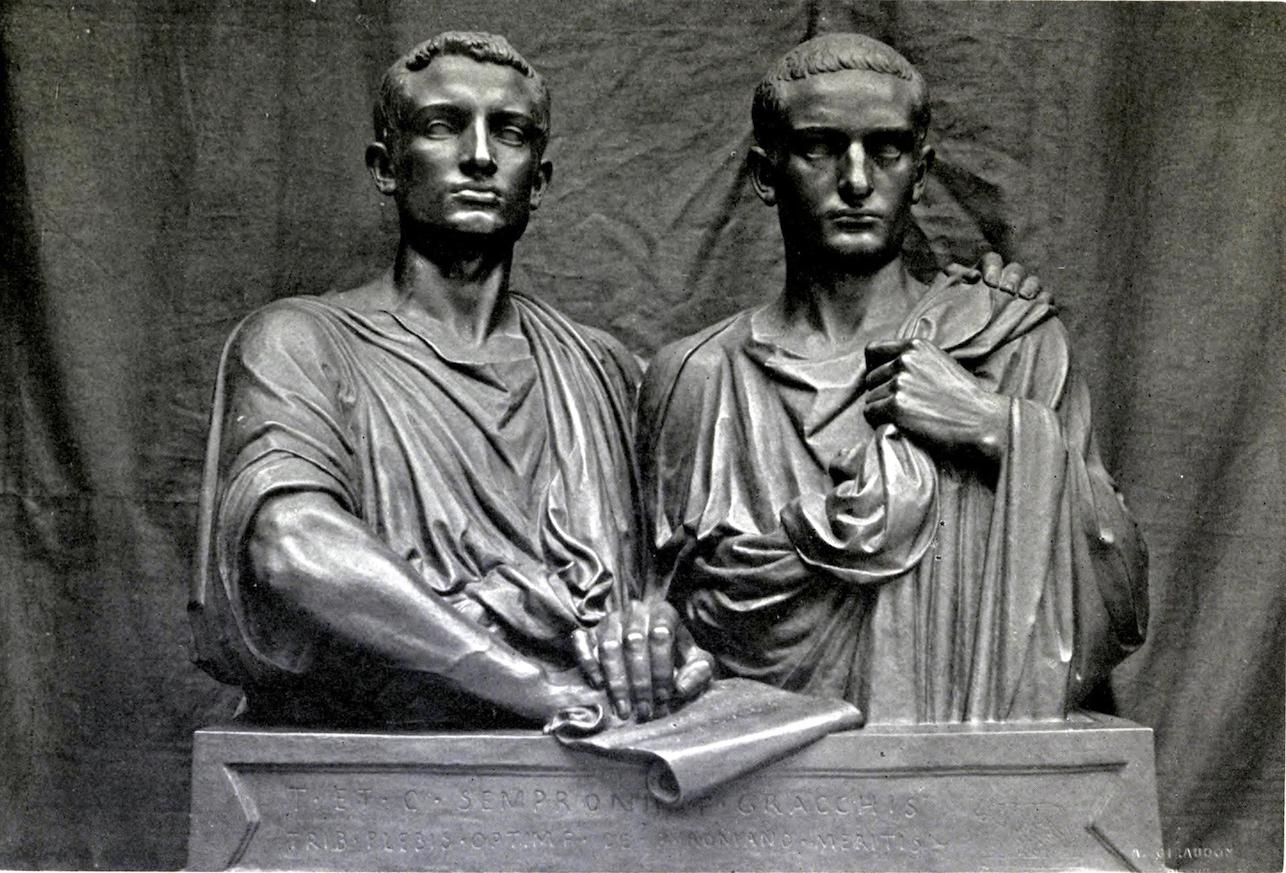Populism and the Politically Excluded: Lessons From Ancient Rome
archive


portrait of Julius Caesar (1892) by Clara Grosch
Populism and the Politically Excluded: Lessons From Ancient Rome
Daniele Archibugi and Marco Cellini have written a clear, scholarly, and provocative analysis (global-e, April 10, 2018) of one of the most interesting and disturbing phenomena in contemporary politics: the rise and contemporary global spread of populism. They remind us how populist politics is already hurting the quality of democracy, and their four propositions on how to respond to this challenge deserve to be taken seriously.
Notwithstanding my general sympathy for their thesis, on one minor issue I find myself in disagreement with the authors. Archibugi and Cellini tell us that “In spite of analytical differences, populism originates from the general discomfort with the inability of liberal democracies to fulfill their promises.” This statement seems obvious, even innocuous. By juxtaposing populism and liberal democracy, Archibugi and Cellini are following a long tradition in contemporary political theory. In fact, as Margaret Donovan (1999; 2004) argues, the dominant approach in the scholarship on populism relies on what might be called the two-strand theory of democracy: modern liberal democracy is an uneasy combination of two fundamentally different sets of principles, liberal on the one hand (concerned with individual rights, universal principles, and the rule of law) and populist/democratic on the other (the sovereign will of the people, typically expressed through referendums).
The problem with the two-strand theory of democracy is that it makes it sounds as if populism is as old as liberal democracies. The same could be said of Archibugi and Cellini’s statement above, which emphasizes the inability not just of democracies to fulfill their promises, but specifically liberal democracies.
This premise to their argument is potentially misleading, and it may even distort and misrepresent certain key aspects of populism. In a nutshell, the issue is this: populism cannot be defined as a challenge to liberal democracies since populism has been around a very long time, predating liberal democracies by many centuries. In this context, looking at ancient forms of populism can be both instructive and revealing, and it can help us have a better understanding of the contemporary phenomenon of populism.
I suggest we go back to Ancient Rome, to the last years of the Republic. Consider the case of Publius Clodius Pulcher, better known simply as Clodius, one of Ancient Rome’s best loved bad boys. He was a social rascal and a political radical, scandalously promiscuous and libertine. Gaining notoriety in 62 BCE when he gate-crashed a solemn, all-female religious festival, he then became one of the most violent and politically dangerous leaders of a populist faction that engineered the exile from Rome of the most ardent defender of the Republic: Cicero. He went on to terrorize the streets of Rome with his private militia. But apart from using violent means to shake the foundations of the status quo, his political project also included radical reforms in the interests of the common people, the Roman plebs, including passing laws that made the distribution of grain in the city entirely free.

There is one curious aspect of Clodius life that makes his political biography compelling, and of particular interest to anyone studying populism today: Clodius was born into a rich, powerful, established, patrician family. What he did in order to gain political power was both unprecedented and remarkable: he turned his back on the patrician roots of his family and asked to be adopted by a plebeian family. As the inimitable Mary Beard (2016, p. 281) puts it: “[Clodius] has gone down in history as the mad patrician who not only arranged to be adopted into a plebeian family in order to stand for the tribunate but also put two fingers up to the whole process by choosing an adoptive father younger than himself.”
In an innovative, non-monarchical political system defined by a complex balancing act between an elite of senators of conservative disposition, hell-bent on maintaining the status quo with all the privileges it bestowed to the small number of ruling families, and a growing underclass of plebeian citizens who had some political representation through the appointment of official tribunes of the people (tribuni plebis), the populist card was often used in the years of the Roman Republic to press on with radical political reforms, often accompanied by bloodbaths.
...populism cannot be defined as a challenge to liberal democracies since populism has been around a very long time, predating liberal democracies by many centuries.
Before Clodius caused havoc and brought mayhem to Rome, the long shadow of populism was cast by two legendary brothers, Tiberius and Gaius Gracchus. Their political agendas and methods were distinctly populist. One brother attempted to pass land reform legislation that would redistribute the major aristocratic landholdings among the urban poor and veterans, the other brother pushed for a subsidized quantity of grain to each citizen of Rome. Both were assassinated for their political vision.
The parallels between the Gracchus brothers and Clodius are many, including the fact that although the Gracchus brothers were officially plebeians, they were born into the old and noble Sempronia family. Their father held all the major political offices in the Republic: tribune of the plebs, praetor, consul, and censor. Their mother was a patrician, Cornelia Africana, daughter of Scipio Africanus, a hero of the war against Carthage.

The Gracchus brothers, by Eugene Guillaume
What can Clodius and the Gracchi brothers teach as about populism in the 21st century? One thing, perhaps. Contrary to what is generally believed, populism is not a bottom-up political movement, the desperate voice of the marginalized masses, the political expression of a final, radical, democratic push by those who for too long have been excluded and are not going to take it any longer. Instead, populism is the brainchild of the elite. That’s how it was in Ancient Rome, and the same is true today.
There is a dominant narrative that suggests that populism is the political manifestation of the ‘masses’ that challenges the hegemony and monopoly of political power firmly held by the ruling ‘elite’. This is reflected in Archibugi and Cellini’s assumption that populism is the voice of the excluded against the entrenched elite, but this is also where I disagree with them. There is another narrative to be told, which suggests that populism is a top-down phenomenon, or at least more so than we are led to believe.
Populism arises in the context of a clash between ruling elites: it is the articulation of a calculated political strategy used by one sector of the elite in order to gain the upper hand on another sector of the elite. In the last analysis, populism can be explained in terms of the masses being instigated and manipulated by some members of the elite in pursuit of their own interests. Seen in this light, populism is a tried and tested political strategy, much older than liberal democracy. Where Clodius and the Gracchi brothers failed, Julius Caesar succeeded: born into a powerful and privileged family, Julius Caesar’s populist appeal was instrumental to undermining the rule of law, culminating in his appointment as ‘dictator for life’.
Contrary to what is generally believed, populism is not a bottom-up political movement, the desperate voice of the marginalized masses… Instead, populism is the brainchild of the elite.
Liberal democracies are not immune from demagogues and populists. Just like in Ancient Rome, modern leaders of right-wing populist movements almost always emerged from privileged backgrounds. Donald Trump positioned himself as the savior of the white, marginalized American lower classes, notwithstanding his family’s status amongst America’s wealthiest elite. He may speak the language of modern day American plebeians, but he was never one of them.
The same is true of Nigel Farage in the UK. A founding member of the xenophobic UK Independence Party (UKIP), Farage sold Brexit to the British people by siding with the British working class against the interference of the European Union and the threat to British jobs posed by immigrants. But Farage was educated in a fee-paying private school, and his father was a stockbroker who worked in the financial district in the City of London. Farage’s predisposition to be seen drinking pints of beer in a pub is equivalent to Trump’s red baseball cap: symbolism and props can go a long way to pretend being what one is not. Trump and Farage, like Caesar and Publius Clodius Pulcher before them, had to shrug off their elitist social classes in order to champion the interests of the masses.
Archibugi and Cellini suggest conceptualizing populism in terms of differences between “incumbents” (elites) and “new entrants” (excluded masses) in the political arena. I think they are right, but only partially. Yes, it is correct to conceptualize populism in terms of “incumbents” and “new entrants,” but it is wrong to assume that the “new entrants” are the excluded masses. Instead, we should think of the “new entrants” as part of the elite—to be precise, that part of the elite that is excluded by another part of the same elite from holding the reins of power.
Beard, Mary (2016). SPQR: A History of Ancient Rome, London: Profile Books 2016.
Canovan, Margaret (2004). ‘Populism for Political Theorists?’, Journal of Political Ideologies,
Volume 9, Issue 3.
Canovan, Margaret (1999). ‘Trust the People! Populism and the Two Faces of Democracy’, Political Studies, Volume 47, Issue 1.



